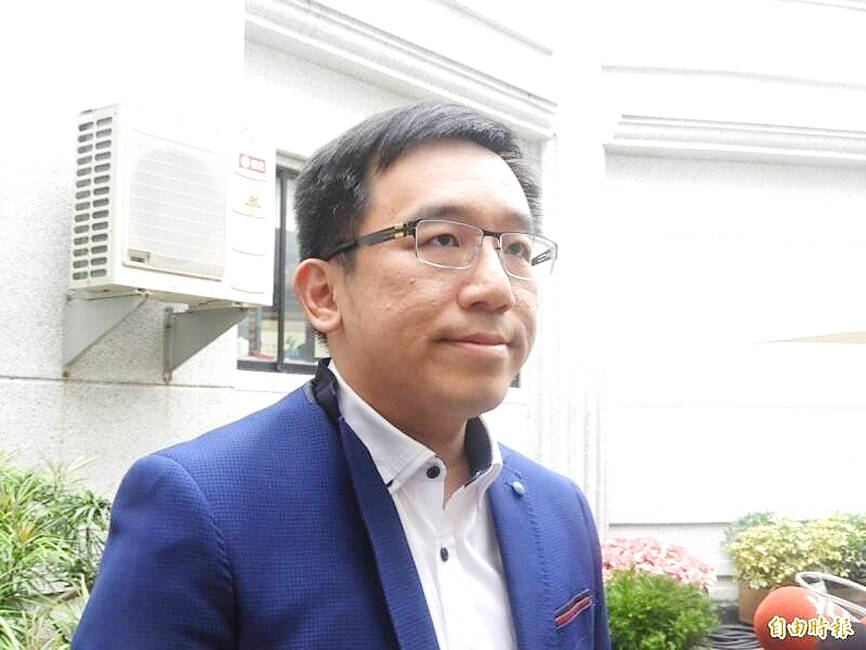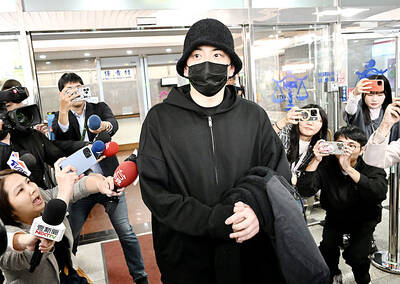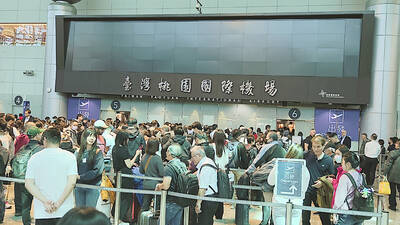Kaohsiung City Councilor Chen Chih-chung (陳致中), who is former president Chen Shui-bian’s (陳水扁) son, was sentenced to one year in jail for his role in a money-laundering scheme connected to corruption cases in which the extended family is involved.
The Supreme Court on Wednesday handed down the one-year sentence combined with a fine of NT$1.5 million (US$48,796) to the younger Chen.
In the same case, Chen Chih-chung’s wife, Huang Jui-ching (黃睿靚), received a 10-month sentence suspended for four years and a NT$1 million fine.

Photo: Ge Yu-hao, Taipei Times
Chen Chih-chung wrote on Facebook in response to the ruling that he would “bravely take the road ahead whatever hardships might lie there.”
The Kaohsiung City Council said that his seat would be vacated.
The Executive Yuan ordered that his seat be vacated in accordance with the Local Government Act (地方制度法), Kaohsiung City Council secretary Huang Chin-ping (黃錦平) said.
The illegal profit of about US$8.169 million that the couple gained from money laundering, which has been seized by prosecutors, would be forfeited and returned to the national treasury, the court said in a statement.
The case is one of several corruption scandals that Chen Shui-bian became embroiled in after his two terms as president from 2000 to 2008, including receiving bribes related to a land deal in Taoyuan’s Longtan District (龍潭) and construction of the Taipei Nangang Exhibition Center.
The Supreme Court’s ruling upheld part of the High Court’s decision on Chen Chih-chung and his wife announced in July last year.
However, the Supreme Court ordered a retrial of a High Court ruling that involved Chen Shui-bian’s wife, Wu Shu-jen (吳淑珍).
The High Court’s investigation indicated that there was intent to commit money laundering by Chen Chih-chung and Huang Jui-ching, the Supreme Court said.
The High Court’s ruling last year said that Wu instructed her son and daughter-in-law to deposit money that she received from bribes into overseas bank accounts and sentenced the 69-year-old to two years in prison.
On Wednesday, the Supreme Court said that the High Court did not have sufficient evidence to prove Wu’s role, so the reasons for finding her guilty were inadequate.
Moreover, the ruling was made while Wu was absent and did not take into account her health problems, it said.
In 2010, Wu was found guilty of corruption in two earlier cases and sentenced to 11 years in jail in one of the cases.
However, Taichung Prison said at that time that it was unable to meet the medical needs of Wu, who uses a wheelchair.
She was instead confined to her son’s home.

The National Immigration Agency (NIA) said yesterday that it will revoke the dependent-based residence permit of a Chinese social media influencer who reportedly “openly advocated for [China’s] unification through military force” with Taiwan. The Chinese national, identified by her surname Liu (劉), will have her residence permit revoked in accordance with Article 14 of the “Measures for the permission of family- based residence, long-term residence and settlement of people from the Mainland Area in the Taiwan Area,” the NIA said in a news release. The agency explained it received reports that Liu made “unifying Taiwan through military force” statements on her online

A magnitude 5.7 earthquake struck off Taitung County at 1:09pm today, the Central Weather Administration (CWA) said. The hypocenter was 53km northeast of Taitung County Hall at a depth of 12.5km, CWA data showed. The intensity of the quake, which gauges the actual effect of a seismic event, measured 4 in Taitung County and Hualien County on Taiwan's seven-tier intensity scale, the data showed. The quake had an intensity of 3 in Nantou County, Chiayi County, Yunlin County, Kaohsiung and Tainan, the data showed. There were no immediate reports of damage following the quake.

Actor Darren Wang (王大陸) is to begin his one-year alternative military service tomorrow amid ongoing legal issues, the Ministry of the Interior said yesterday. Wang, who last month was released on bail of NT$150,000 (US$4,561) as he faces charges of allegedly attempting to evade military service and forging documents, has been ordered to report to Taipei Railway Station at 9am tomorrow, the Alternative Military Service Training and Management Center said. The 33-year-old would join about 1,300 other conscripts in the 263rd cohort of general alternative service for training at the Chenggong Ling camp in Taichung, a center official told reporters. Wang would first

MINOR DISRUPTION: The outage affected check-in and security screening, while passport control was done manually and runway operations continued unaffected The main departure hall and other parts of Terminal 2 at Taiwan Taoyuan International Airport lost power on Tuesday, causing confusion among passengers before electricity was fully restored more than an hour later. The outage, the cause of which is still being investigated, began at about midday and affected parts of Terminal 2, including the check-in gates, the security screening area and some duty-free shops. Parts of the terminal immediately activated backup power sources, while others remained dark until power was restored in some of the affected areas starting at 12:23pm. Power was fully restored at 1:13pm. Taoyuan International Airport Corp said in a